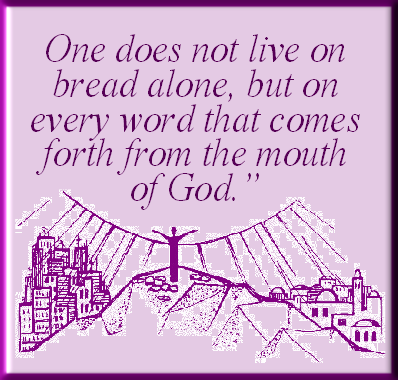It is an interesting feature of the Gospels that in the fourth and final one –John – there is no account, never mind a mention of the temptations of Jesus. This seems surprising – to say the least – given that it was written in part to counteract the heresy of Docetism – that Jesus only seemed but was not in substance human. Perhaps the evangelist thought that the others, especially Luke and Matthew, had dealt with it adequately. Whatever the motivation of the author this seeming lacuna in the last Gospel only serves to show that the Gospels were not written for apologetic purposes but to proclaim to the various churches the presence of God in the person of Jesus the Christ and their continuing power through the Holy Spirit. The three temptations of Jesus are not simply a morality tale, telling the struggle between good and evil but transcend this, revealing the metaphysical duel between God and the devil.
Luke situates the temptations immediately before the beginning of Jesus’ ministry and his announcement in the synagogue at Nazareth where he proclaims that ‘the Spirit of the Lord is upon him’: Matthew prefers to place them after the baptism of Jesus by John where he hears the words from heaven that he is the ‘Beloved Son’ in whom God ‘is well pleased’. This benefit of this benediction is brought out in the end of today’s Gospel when ‘angels appeared and looked after him’.
The three temptations told in today’s Gospel entice Jesus to become an exhibitionist, build an earthly empire, be an egoist. The exhibitionist aims for the spectacular event to show off and be seen as victorious and not a victim. Not satisfied with surprise and scorning simplicity for the spectacular, the exhibitionist may employ means that are shocking and even violent. The empire builder seeks superior status by showing a superfluity of power and privilege, pleasure and possessions or some sum of these. Prepared to sacrifice everything in the blind pursuit of these, the sacrifice of others for this end is simply seen as part of the price to be paid for personal gain and grandiosity. Unlike the exhibitionist and empire builder, the egoist has no need for applause or accumulation, acting out of arrogance and the ambition to be absolutely self-determining.
This trifecta contain another temptation in the Christian life, the tendency to the reductionism of morality alone. Moralism has been the bane of teaching and preaching for too long; thankfully a renewed moral since the Second Vatican Council theology has tried to lift the burden of legalism from people.
The significance of Jesus’ scorning the devil’s not too subtle suggestions and sending him packing is salvific when set against the spectrum of sin shown in the other readings. They bring out the biblical account of sin, beginning with the original sin of Adam and Eve that descends into the projection of responsibility onto others, sadly a feature of so many institutions and relations. The guilt evinced in the Miserere (Psalm 50) expresses the personal awareness of guilt and asking God for purification. Paul presents the New Adam, the obedience of whom works out the salvation of the world. Jesus is certainly held up as a moral exemplar to be imitated but, Paul goes much further, proclaiming that it is this ‘one man Jesus Christ [who] will cause everyone to reign in life who receives the free gift that he does not deserve, of being made righteous’. For Paul himself learned that it is not by keeping the rules we are made righteous but by faith in the offer and outreach of Jesus that opens up the saving the mercy of God.
Temptation is the way of the Evil One, God’s way is transformation. This is the choice Lent lays before us, to follow or forget Christ’s fundamental option in obedience to the Father’s will.
‘At its core, holiness is experiencing, in union with Christ, the mysteries of his life’ (Par. 20)
In a memorable phrase the Second Vatican Council described a Christian ‘as one who has been made a partner in the paschal mystery’. The call to holiness is to make this partnership as personally complete as possible through that conversion which Pope Francis says ‘consists in uniting ourselves to the Lord’s death and resurrection in a unique way, constantly dying and rising with him’. Spelling out what ‘in a unique way’ means Francis mentions that sharing in the paschal mystery can involve showing a particular part or period of the earthly life of Jesus which is the prelude to his passion and resurrection. The temptations that Jesus endured, expressed in today’s Gospel, offer an invaluable entrée for contemplating, both personally and communally, how to respond to the invitation to imitate Jesus.
Fr Kevin O’Gorman SMA

